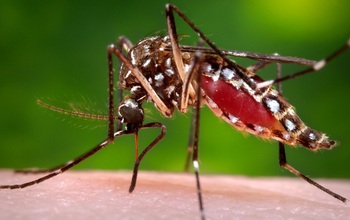 September 30, 2015 - A new 5 year multi-institutional collaborative research grant of $1.85 million funded by the National Science Foundation’s Ecology and Evolution of Infectious Diseases (NSF EEID) program will support research on the effect of temperature on 13 different diseases that use insects for transmission. It will also measure the capacity for two common disease-carrying mosquitoes in the Americas to adapt to new (or changing) temperatures. FCI affiliates Dr. Sadie Ryan (UF), Dr. Leah Johnson (USF), and Dr. Jason Rohr (USF) are three of the investigators on the project.
September 30, 2015 - A new 5 year multi-institutional collaborative research grant of $1.85 million funded by the National Science Foundation’s Ecology and Evolution of Infectious Diseases (NSF EEID) program will support research on the effect of temperature on 13 different diseases that use insects for transmission. It will also measure the capacity for two common disease-carrying mosquitoes in the Americas to adapt to new (or changing) temperatures. FCI affiliates Dr. Sadie Ryan (UF), Dr. Leah Johnson (USF), and Dr. Jason Rohr (USF) are three of the investigators on the project.Many of the world’s most devastating and neglected infectious diseases are spread to people by mosquitoes and other insects. Malaria, a mosquito-transmitted parasite, kills over 650,000 people each year. Dengue fever, an incurable mosquito-borne virus, infects around 400 million people annually, a rate which has grown dramatically in recent decades. With limited options for medical treatment or vaccination, preventing infection is the best way to control these diseases. This approach requires understanding—and predicting—how the climate affects mosquitoes and the diseases they carry.
“If we want to predict the spread of mosquito-transmitted diseases, we have to learn how these insects and pathogens respond to the environment and changing climate,” says Dr. Sadie Ryan, Assistant Professor of Medical Geography at the University of Florida and co-principal investigator on the project. “We will improve on our existing predictive models by validating them with real data. Integrating field data on local conditions with mapped model predictions will enable us to understand the multiscalar dynamics of climate-disease relationships.”













